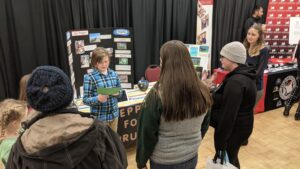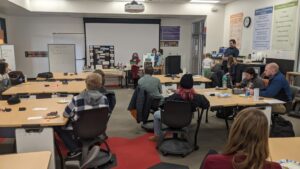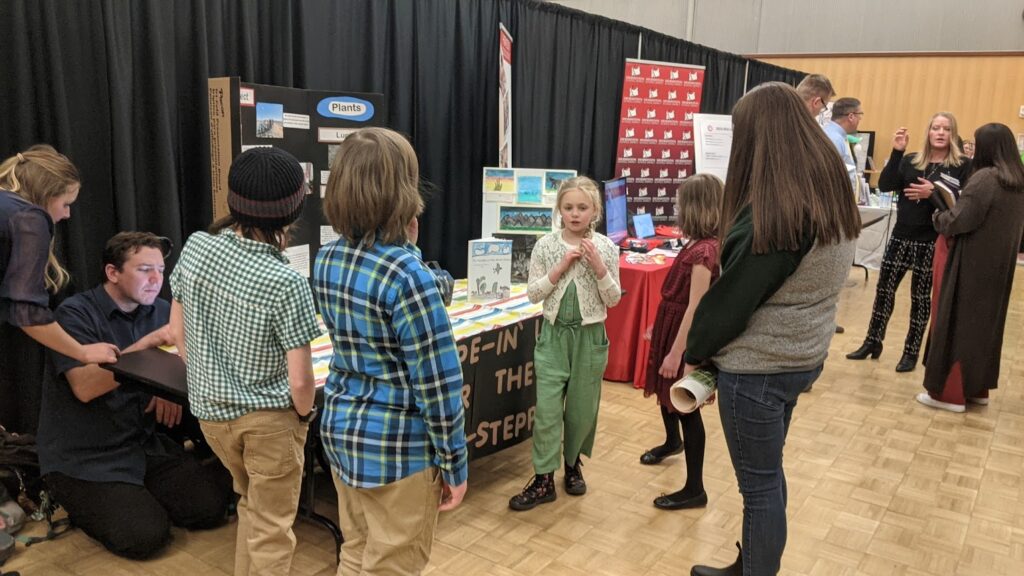Students from Ellensburg’s Discovery Lab awoke on February 23, filled with anticipation. Today was the day they would meet Governor Inslee, share their findings about the shrub-steppe ecosystem with local legislators and connect with other student groups who have similar interests. Their school wouldn’t open for another hour but already the 2nd through 5th graders were piled into an extra-large SUV and raring to make the long drive to Olympia.
Alas, the weather had other plans. As reports of multiple school closures due to winter conditions came in, PEI’s staff made the difficult decision to cancel the scheduled Environmental & Sustainability Literacy Student Summit. For the eighteen teams from around the state who had planned to attend, it was a disappointing finish to months of effort.
“By the end of the day, they were very confident and ready to talk to anyone who came to their booth. They were actively recruiting anyone who came within shouting distance. I saw huge leaps in confidence.”
— Megan Rivard, PEI’s Central Washington FieldSTEM Coordinator

But although the day got off to a rough start for the Ellensburg students, by the time it was over they had presented to two separate groups of adults, been on a local radio show and received a free lunch. It began with a question PEI’s Central Washington FieldSTEM Coordinator posed to Discovery Lab’s director Natalia Parker: did she want to wait and see if the event was rescheduled or pivot? Parker chose to pivot.
After a flurry of calls, Rivard had found a new audience for the presentation. The education department at Central Washington University was holding a career fair for students interested in becoming teachers. “I was thinking, there are booths, there are tables and people are walking around, and it’s tied to education,” she explains. “These kids will get to show off what students are capable of and maybe inspire some future teachers.”
The WSU Department Chair of Science and Mathematics Education also invited the group to a TeachSTEM program potluck where they would have had another opportunity to present their research (and eat lunch). In the meantime, Parker contacted Ellensburg Community Radio to see if they might have a slot available for the students. The answer was yes.
“They read their speeches on the air,” says Rivard, “then went to CWU for their potluck lunch and presentation, and then they walked to another building to do the career fair. By the end of the day, they were very confident and ready to talk to anyone who came to their booth. They were actively recruiting anyone who came within shouting distance. I saw huge leaps in confidence.”
As she had anticipated, their audience was impressed by the students’ knowledge and presentation skills. One question they heard repeatedly was, ‘Wait, what grade are you in?’
Although the mayor of Ellensburg wasn’t available that day, she later invited the students to come to city hall and do a presentation

specifically for city staff.
Since then, PEI and OSPI staff made the even more difficult decision to not reschedule the summit this year after several attempts to align schedules and logistics for a rescheduled date, as well as considering SBA testing, end-of-year activities and graduations.
The cancelation of the student summit was tough for everyone, from the students who spent months preparing, the teachers and administrators who supported them and the agency personnel who were looking forward to interacting with them. However, we are trying to find the silver lining and are in the process of seeing whether we can put a video together of this year’s participants. Stay tuned for that development.
In the meantime, PEI encourages student teams and their lead teachers to connect with audiences in their communities and share their presentations. The experience will be valuable for both students and audience and who knows? They might even end up on the radio.
